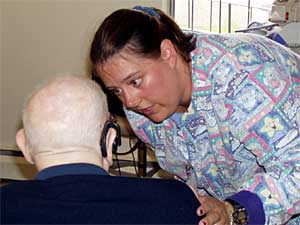|
Audio
Photos
Resources
Your Voice
|
Dentists concerned over changes in state law
August 3, 2003
Dentists who serve lower income adults say they expect a new law to make things difficult for them. The law, which takes effect in October, will cap state-subsidized payments for dental services. The change was part of the Legislature's efforts to balance the state's budget. Dentists say they're worried the law will present an ethical dilemma and could prompt many to decide against treating lower income individuals altogether.
St. Paul, Minn. — The new law means that dentists who provide low income dental care will be reimbursed no more than $500 a year per patient. There are a few exceptions -- if a patient needs emergency care, a tooth pulled for dentures or needs dentures altogether. Several dentists say they're concerned that the new law will cause problems for people who need appropriate treatment.
Jane Cernohous is a community dentist with Apple Tree Dental. She and other dentists travel around the Twin Cities with their mobile dental unit to nursing homes, Head Start centers or other community clinics. On a recent day, Cernohous is treating a patient at a Minneapolis nursing home.
 | |||
Cernohous says she's concerned the new $500 cap for adults on Medical Assistance, MinnesotaCare and General Assistance Medical Care will be most problematic for people who don't receive regular dental treatment. She says it's typical that new nursing home residents will need thousands of dollars of care, because they haven't had dental insurance for quite some time.
"Those are probably the new folks who are going to be hit the hardest with this," Cernohous said. "It's very typical for a patient to come in and need three or four teeth removed, four or five fillings, maybe several cleanings to get things in order. So that's where I will see the need, is with the new patients."
Carl Ebert, director of community dentistry at Apple Tree Dental, says he's concerned that the cap could create an ethical dilemma for dentists. He says dentists will struggle to provide appropriate treatment while staying under the $500 cap.
"What do they do? Do they keep a caculator in the operating room and then stop arbitrarily when it hits $500?" said Ebert. "Nobody in their right mind would think that's what they'll do, but they are going to be rationing care somehow. And that is a very difficult decision for a provider to make -- where do you stop?"
|
What do they do? Do they keep a caculator in the operating room and then stop arbitrarily when it hits 500 dollars? Nobody in their right mind would think that's what they'll do -- but they are going to be rationing care somehow.
- Carl Ebert, Apple Tree Dental |
Others say the new law will add another administrative layer to dentists who treat those with lower incomes.
Scott Lingle is a dentist in private practice who also treats lower income patients in his St. Paul office.
"Every time a patient comes in, we'll have to call DHS, Lingle said. "They'll have to stay as current on the information as they can, and it can't be up to the minute, probably."
Lingle says he hopes to continue to provide treatment for lower income patients. But others may decide it's not worth it, and that could compound an existing problem.
Karl Self says there's a shortage of dentists who treat the lower income, especially in the rural parts of the state. Self is a dentist and executive director of the Community University Health Care Center in Minneapolis. He says he expects the problem to get worse statewide.
"I'll be interested in seeing the data a year from now. But I anticipate that there will be less private practice providers who will be accepting government program patients," Self said.
Officials with the Department of Human Services say they're trying to sort out how to handle the new law. Brian Osberg, assistant commissioner of Health at DHS, says he's trying to interpret what falls under emergency treatment. Osberg says he believes many dentists will be OK with the cap -- if emergency services can be provided to any individual who experiences pain.
 | |||
"We are certainly concerned about dental access in general, and whether or not this provision will cause more dentists to leave programs," Osberg said. "We're not sure about it. We're talking to them about administering this arrangement."
But Sate Rep. Tim Wilkin, R-Eagan, says DHS should follow an established code for emergency services which includes items like having teeth knocked out.
Wilkin says he pushed for the change because of the state's budget problems. He says the state isn't required to provide adult dental care for adults -- and the cap is better than no dental coverage at all.
"Rather than just totally getting rid of dental we wanted to keep that intact," Wilkin said. "If you look at some of the dental needs of lower income populations, it could really hurt them if we got rid of the coverage."
Minnesota will be one of a handful of states in the nation to have a cap on dental services, when the law takes effect in October.
|
News Headlines
|
Related Subjects
|

